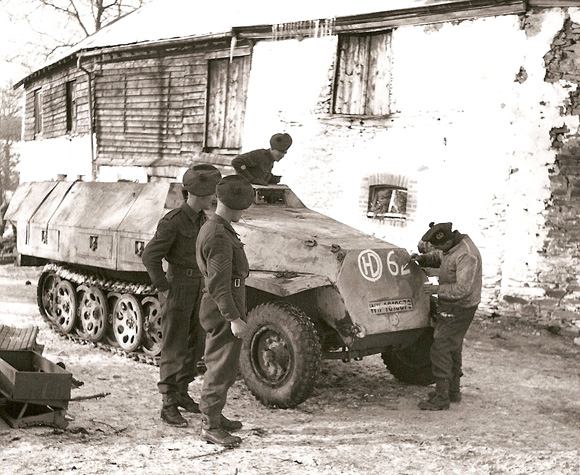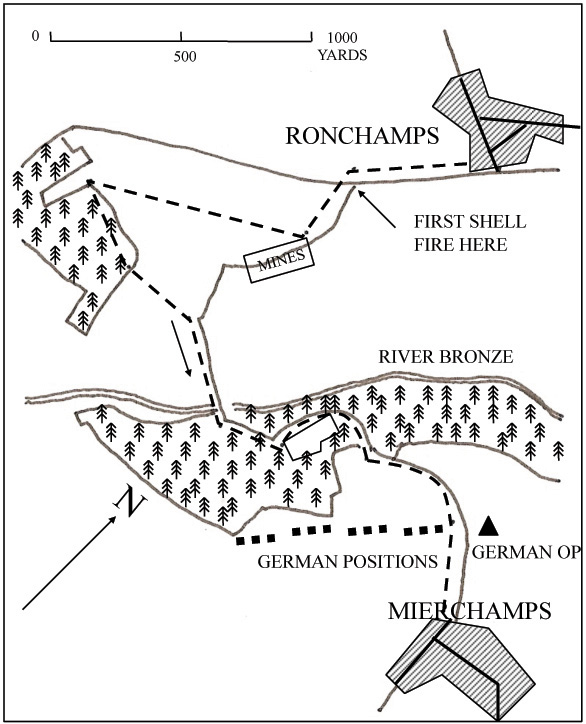Ronchamps
10th January 1945

Captured German half track
show infoDescription:
Men of 5/7th Gordons paint the 51st Highland Division badge on a captured German half track. 16 January 1945
Copyright:
IWM - B 13735
Tags:
On 10th January 152 Brigade moved through 153 Brigade with the task of pushing across the Marche - La Roche road and on to take Ronchamps thus covering the right flank of the divisional advance down the Ourthe valley. The Brigade was supported by the East Riding Yeomanry.
The 5th Seaforth captured Gênes which was not defended, however they lost two armoured cars from the Derbyshire Yeomanry to a minefield which was covered by snow. 2nd Seaforth then advanced through the 5th Seaforth towards Halleux capturing it by noon. At about 1400 hrs the 5th Camerons also moved through 5th Seaforth in the direction of Ronchamps. There was little enemy resistance but minefields and shelling, the latter causing a number of casualties, coupled with the thick snow made progress slow.
As Ronchamps was reached at about 2100 hrs the German rearguard withdrew. The Brigade had taken its objectives and went firm, however the next day they suffered sustained artillery bombardment and suffered a number of casualties. The Germans had taken up a strong position just over a mile south of Ronchamps and forward of Mierchamps.
The following account of the action at Ronchamps is taken from "Sans Peur" by Alastair Borthwick.
"There were three parallel ridges. Between the first and second was a wide, gently sloping valley. Between the second and third was a valley more deeply cut, narrow and very steep. We were on the first ridge. The Camerons were on the second, astride the crossroads at Ronchamps. The Germans were on the third. Beyond the third, out of sight behind the crest, was Mierchamps.
"It was a crisp white-and-blue morning, with the sun sparkling on the snow, and the air wonderfully clear. It was the kind of day set aside by Providence for the waxing of skis and the building of snow-men, and war seemed even more of a nonsense than usual. The sky was eggshell blue, and there was blue in the shadows of the drifts, and the snowfields stretched silver as far as we could see as we marched down into the first valley. The whole countryside was at peace except for one small angry spot half a mile ahead, where the Germans were pasting the living daylights out of Ronchamps. We were going to Ronchamps. The shell-bursts were black against the snow. Nobody was particularly chatty as we trudged up the hill towards them.
"We stopped a little short of the crossroads, and waited. The Boche, said the Camerons, were still on the third ridge, so this was not going to be another route march. There were recces, and an "O" Group, and a lot of shells much too close, and then it was 1400 hours and we were attacking.
"As this turned out to be the most peculiar attack we were ever involved in, the plan and the situation on which it was based must be gone into in some detail. We did not have a great deal to go on. The Boche were known to be pulling back, but no one knew how quickly they were doing it. They were shelling Ronchamps crossroads with great zest. This might mean they were covering a withdrawal, but on the other hand it might mean nothing of the sort. A few Boche had been seen earlier in the morning walking about on their own crest. A road sloped obliquely down to the right into the valley from the end of Ronchamps (the valley wall was too steep for the road to take it straight), crossed a small bridge on the valley floor, and crawled obliquely left up the far side. Down in the valley were thick pine-woods, but the upper slopes were bare. Early in the morning the bridge had not been blown, but there was no guarantee that it was still intact. There were mines on the road on our side of the bridge. That was all the information we had. Of the strength or dispositions of the enemy we knew nothing.
"Major Powell decided to treat the whole business as an advance to contact rather than as a set-piece attack. "A" Company plus a troop of tanks and an armoured bulldozer was to be the advance-guard, followed by Tactical H. Q., followed by "C" Company. The other two companies were to remain where they were, near Ronchamps crossroads; and in the event of something solid being hit by the advance guard, "B" and "C" Companies were to put in a right-flanking attack on Mierchamps. "D" Company was to be in reserve for counter-attack."

